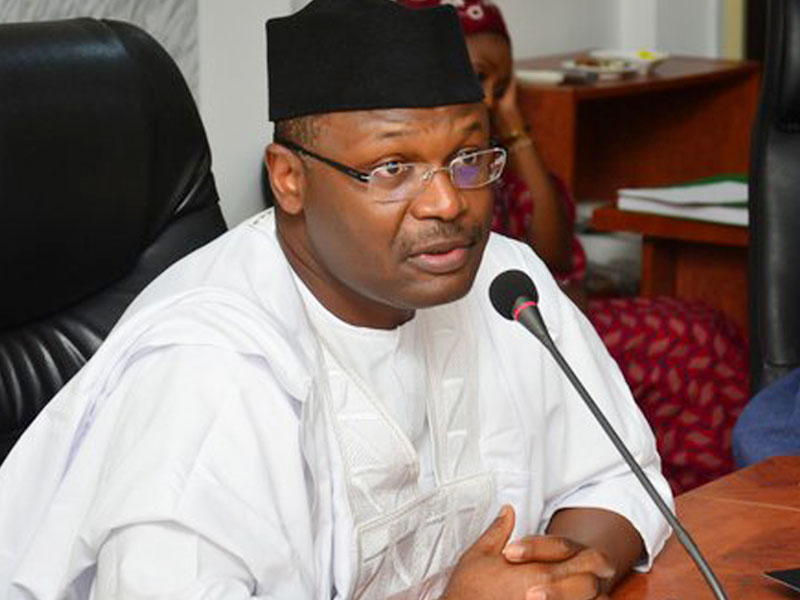
By Omodele Adigun
The Independent National Electoral Commission (INEC) has explained why it cannot sanction politicians flouting the ban on campaign ahead of election.
INEC Chairman, Prof. Mahmood Yakubu, made the explanation at a one-day roundtable on the challenges of early political campaigns, organised by The Electoral Institute (TIE) in Abuja on Wednesday.
Yakubu noted that while Section 94(1) of the Electoral Act 2022 prohibited campaigns from starting earlier than 150 days before an election, it lacked a specific sanction for this particular offence.
He explained that this legal gap made it difficult for the commission to enforce the law, as the existing penalties were aimed at campaigns conducted within 24 hours of an election.
He said that while premature campaigns were prohibited and allowed elected leaders to prioritise governance over electioneering from one electoral cycle to another, political parties, candidates and their supporters seemed to be perpetually in election mood.
He said this had remained the case even when the commission is yet to release the Timetable and Schedule of Activities for Elections or ahead of the timeframe provided by law.
“Around the country, we have seen outdoor advertising, media campaigns and even rallies promoting various political parties and candidates.
“These actions and activities undermine the commission’s ability to track campaign finance limits as politicians, prospective candidates and third-party agents expend large amount of money that cannot be effectively monitored before the official commencement of campaigns.
“Quite correctly, Nigerians expect INEC, as registrar and regulator of political parties, to act in the face of the brazen breach of the law on early campaigns.
“However, the major challenge for the commission is the law itself.
“Sections 94(2) of the Electoral Act 2022 imposes sanctions, albeit mild (a maximum amount of N500,000 on conviction), on any political party or a person acting on its behalf, who engaged in campaigns 24 hours before polling day.”
He, however, said there is no sanction whatsoever, concerning breaches for campaigns earlier than 150 days to an election.
“Here lies the challenge for the commission in dealing with early campaign by political parties, prospective candidates and their supporters,’’ he said.
Yakubu said why the problem of early campaign in Nigeria was not new, the seeming inability of INEC and other regulatory agencies to deal with the menace within the ambit of the existing electoral legal framework called for deep reflection.
He said it was in that context that INEC considered it appropriate to convene the dialogue in which legislators, leaders of political parties, civil society organisations, experts, practitioners and regulators would brainstorm on the way forward.
“I am glad that the immediate past chairman of INEC, Prof. Attahiru Jega, is here to share his experience on the matter in a Keynote Address.”
“Similarly, as the National Assembly is currently reviewing our electoral laws, the commission has also invited the leadership of both the Senate and House of Representatives Committees on Electoral Matters,’’ he said.
He expressed confidence that all stakeholders would come up with actionable recommendations.
The stakeholders, he said , included the Nigerian Bar Association (NBA) the Broadcasting Organisation of Nigeria (BON) the National Broadcasting Commission (NBC) and the Advertising Regulatory Council of Nigeria (ARCON).
In his remarks, Prof. Abdullahi Zuru, INEC National Commissioner and Chairman of the Board of the Electoral Institute, described premature campaigns as a creeping danger to Nigeria’s democracy.
Zuru cited the growing use of cultural festivals, religious gatherings, and philanthropy as camouflage for veiled campaign messages, alongside billboards, branded vehicles and social media contents that skirt the law.
These activities, Zuru said, distorted the political environment, and not only inflated the cost of elections but also distracted office holders from service delivery.
He added that such actions also eroded public confidence in institutions, and fed cynicism about whether laws could ever be enforced.
He called for clearer definitions in the law, stronger enforcement mechanisms, civic education for citizens, and active collaboration with media platforms to check the trend.
The Inspector General of Police, Kayode Egbetokun, represented by the Commissioner of Police in charge of Elections, Abayomi Sogunle, reiterated police’s commitment to enforcing all laws and to ensuring credible and peaceful elections in the country.
–




Having read this I believed it was extremely enlightening.
I appreciate you spending some time and effort to put this information together.
I once again find myself personally spending a lot of time both reading and commenting.
But so what, it was still worthwhile!
I was recommended this blog by my cousin. I am not sure whether this post is written by him
as no one else know such detailed about my problem.
You are amazing! Thanks!
6ywy5i
7ug5aj
iwin – nền tảng game bài đổi thưởng uy tín, nơi bạn có thể thử vận may và tận hưởng nhiều tựa game hấp
利用强大的谷歌蜘蛛池技术,大幅提升网站收录效率与页面抓取频率。谷歌蜘蛛池
Tham gia cộng đồng game thủ tại Go88 để trải nghiệm các trò chơi bài, poker phổ biến nhất hiện nay.
Khám phá thế giới giải trí trực tuyến đỉnh cao tại MM88, nơi mang đến những trải nghiệm cá cược thể thao và casino sống động.
搭载智能站群程序,自动化搭建与管理,为SEO项目提供核心驱动力。站群程序
Tham gia cộng đồng game thủ tại Go88 để trải nghiệm các trò chơi bài, poker phổ biến nhất hiện nay.
搭载智能站群程序,自动化搭建与管理,为SEO项目提供核心驱动力。站群程序
Với giao diện mượt mà và ưu đãi hấp dẫn, MM88 là lựa chọn lý tưởng cho các tín đồ giải trí trực tuyến.
Khám phá thế giới giải trí trực tuyến đỉnh cao tại MM88, nơi mang đến những trải nghiệm cá cược thể thao và casino sống động.
Với giao diện mượt mà và ưu đãi hấp dẫn, MM88 là lựa chọn lý tưởng cho các tín đồ giải trí trực tuyến.
kuwin sở hữu kho game đa dạng từ slot đến trò chơi bài đổi thưởng, mang đến cho bạn những giây phút giải trí tuyệt vời.